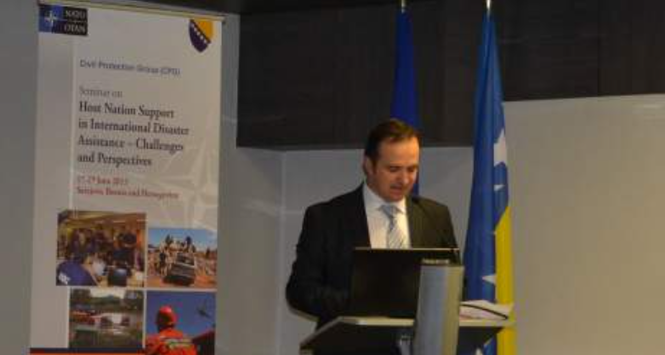
More than 80 participants, including authorities from 24 countries gathered in Sarajevo from 17 to 20 June for the NATO Civil Protection Group annual seminar. Under this year’s theme “Host Nation Support in International Disaster Assistance – Challenges and Perspectives,” civil protection authorities and experts learned about existing guidelines and shared their national experiences in sending and receiving international assistance.
Emphasising NATO’s critical role in this area, Guenter Bretschneider, Head of NATO’s Euro-Atlantic Disaster Response Coordination Centre (EADRCC) said that the EADRCC frequently serves as a “clearing house mechanism” for requests and offers of bilateral assistance. More than 50 such requests have been coordinated through the centre over the last 15 years. Bretschneider also highlighted the importance of clarity on legal status and liability issues to facilitate swift response, noting that he has seen deployments held-up on this account.
A number of participants shared on-going processes to review their domestic frameworks for international response. Almir Beridan of the Ministry of Security outlined Bosnia and Herzegovina’s legally binding framework for international disaster response, noting that it is currently developing standard operating procedures drawing on both the EU host nation support Guidelines and the IDRL Guidelines.
Among the key findings of the seminar was the need to consolidate or rationalise existing guidelines. Participants shared the view that each set of guidelines, including the EU Host Nation Support Guidelines, NATO’s Checklist and Non-Binding Guidelines for the Request, Reception and Provision Of International Assistance in the Event of a CBRN Incident or Natural Disaster, and the IDRL Guidelines, were useful references for the development of domestic procedures. While recognising that the guides were developed in sequence and that each builds on the last, participants suggested that the existing instruments should be consolidated to avoid duplication and possible confusion – ideally in a single tool with global reach.
Elyse Mosquini of the IFRC’s Disaster Law Programme participated in the seminar and delivered a presentation on the IDRL Guidelines, related tools and current developments in the field. The presentation was welcomed by participants – while most were familiar with the IDRL Guidelines, they had not known before the relationship among the various sets of guidelines or their distinctions. As noted by Claudiu Zoicas, Romania’s representative to the NATO Civil Protection Group, “the IFRC’s IDRL Guidelines were pivotal, spurring the development of so many related tools – including NATO’s own checklist and non-binding guidelines. Our challenge now is to take this work even further to address remaining gap areas such as the status and liability of civilian relief personnel.”
The seminar also offered an opportunity to generate new interest on two related projects to which the Disaster Law Programme is contributing. The IFRC’s Disaster Law Programme is supporting five European National Societies to conduct a study on the implementation of the EU Host Nation Support Guidelines. Authorities from two of the countries taking part in this ECHO-funded study were represented at the seminar. In addition, Elyse Mosquini is advising on a project to develop a model document collecting a range of liability clause options. The project is driven by an ad hoc working group of NATO’s Civil Protection Group.